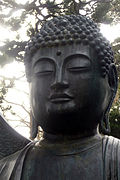Work and teaching
Since 2001, Odland has been teaching full time at Zengården, Zenbuddhistiska Samfundet's training temple in Fellingsbro in rural Sweden. [7] ZBS also has centers in Stockholm, Gothenburg, Lund, Tampere (Finland), Cologne (Germany) and Glasgow (Scotland). [4] The association has approximately 500 members [8] and is a member organisation in the Swedish Buddhist Community. [9]
Odland regularly offers sesshin (meditation retreats) in English and gives public talks on Zen. She is active in contemporary Swedish intellectual and cultural life. [1] [10] [11]
Her first book Vandring på Spårlös Stig was published in 2013, and she has written various articles on Zen, including a commentary on the mu-koan published in Zen Bow magazine. [12] [13]
This page is based on this
Wikipedia article Text is available under the
CC BY-SA 4.0 license; additional terms may apply.
Images, videos and audio are available under their respective licenses.









